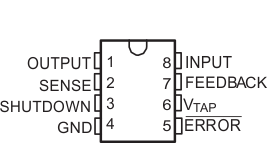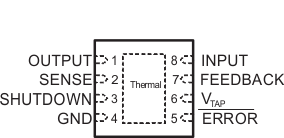SLVSAW6H June 2011 – November 2024 LP2951-Q1
PRODUCTION DATA
- 1
- 1 Features
- 2 Applications
- 3 Description
- 4 Pin Configuration and Functions
- 5 Specifications
- 6 Detailed Description
- 7 Application and Implementation
- 8 Device and Documentation Support
- 9 Revision History
- 10Mechanical, Packaging, and Orderable Information
Package Options
Mechanical Data (Package|Pins)
Thermal pad, mechanical data (Package|Pins)
- DRG|8
Orderable Information
4 Pin Configuration and Functions
 Figure 4-1 D Package (LP2951-50-Q1),8-Pin SOIC(Top View)
Figure 4-1 D Package (LP2951-50-Q1),8-Pin SOIC(Top View) Figure 4-2 DRG Package,8-Pin WSON With Exposed Thermal Pad(Top View)
Figure 4-2 DRG Package,8-Pin WSON With Exposed Thermal Pad(Top View)Table 4-1 Pin Functions
| PIN | TYPE(1) | DESCRIPTION | ||
|---|---|---|---|---|
| NAME | NO. | |||
| ERROR | 5 | O | Active-low, open-drain error output. Goes low when VOUT drops by 6% of the nominal value. | |
| FEEDBACK | 7 | I | Determines the output voltage. Connect to VTAP (with OUTPUT tied to SENSE) for fixed output option, or connect to a resistor divider for adjustable output option. | |
| GND | 4 | — | Ground | |
| INPUT | 8 | I | Input supply pin. Use a capacitor with a value of 1µF or larger from this pin to ground is recommended. See the Input and Output Capacitor Requirements section for more information. | |
| OUTPUT | 1 | O |
A capacitor is required from OUTPUT to GND for stability. For best transient response, use the nominal recommended value or larger ceramic capacitor from OUTPUT to GND(2). Place the output capacitor as close to the device output as possible. See the Input and Output Capacitor Requirements section for more details. |
|
| SENSE | 2 | I | Senses the output voltage. Connect to OUTPUT (with FEEDBACK tied to VTAP) for fixed output option only. If using the device as adjustable output, this pin must be left floating. | |
| SHUTDOWN | 3 | I | Active-high input. A high signal disables the device; a low signal enables the device. | |
| VTAP | 6 | O | Connect to FEEDBACK for fixed output option. If using the device as adjustable output, this pin must be left floating. | |
(1) I = Input, O = Output.
(2) The nominal output capacitance
must be greater than 1μF. Throughout this document, the nominal derating on
these capacitors is assumed to be 50%. Verify that the effective capacitance at
the pin is greater than 1μF.